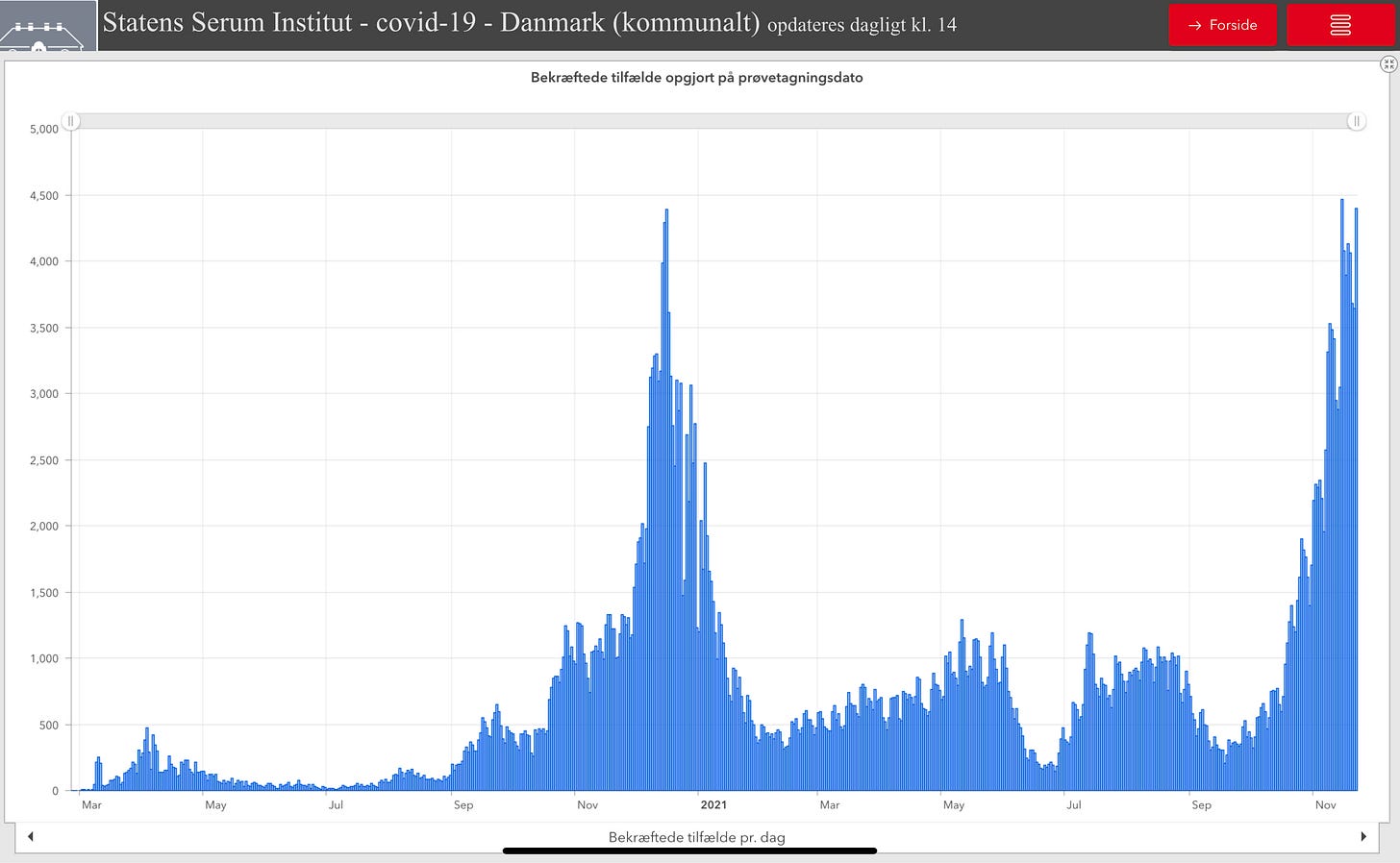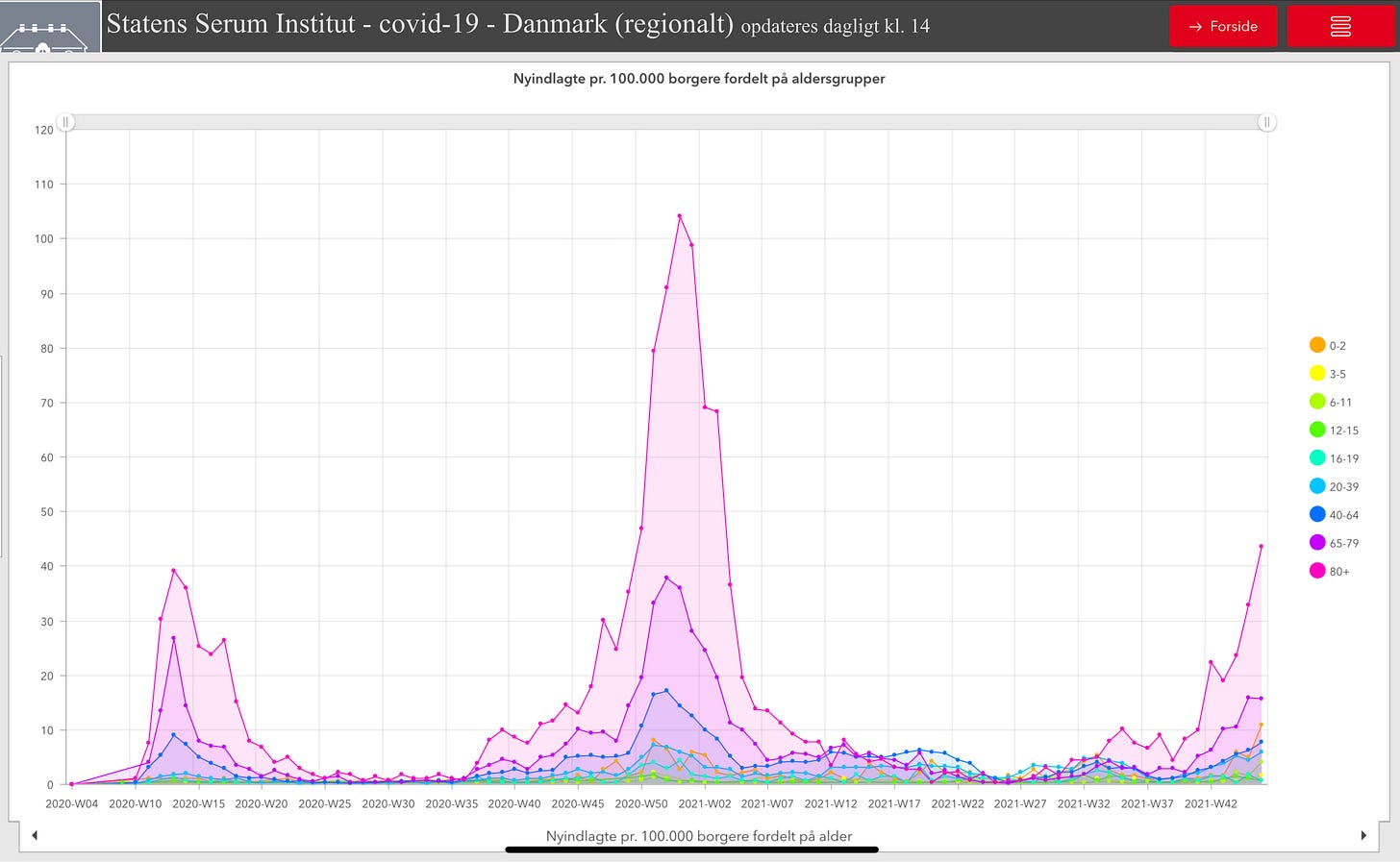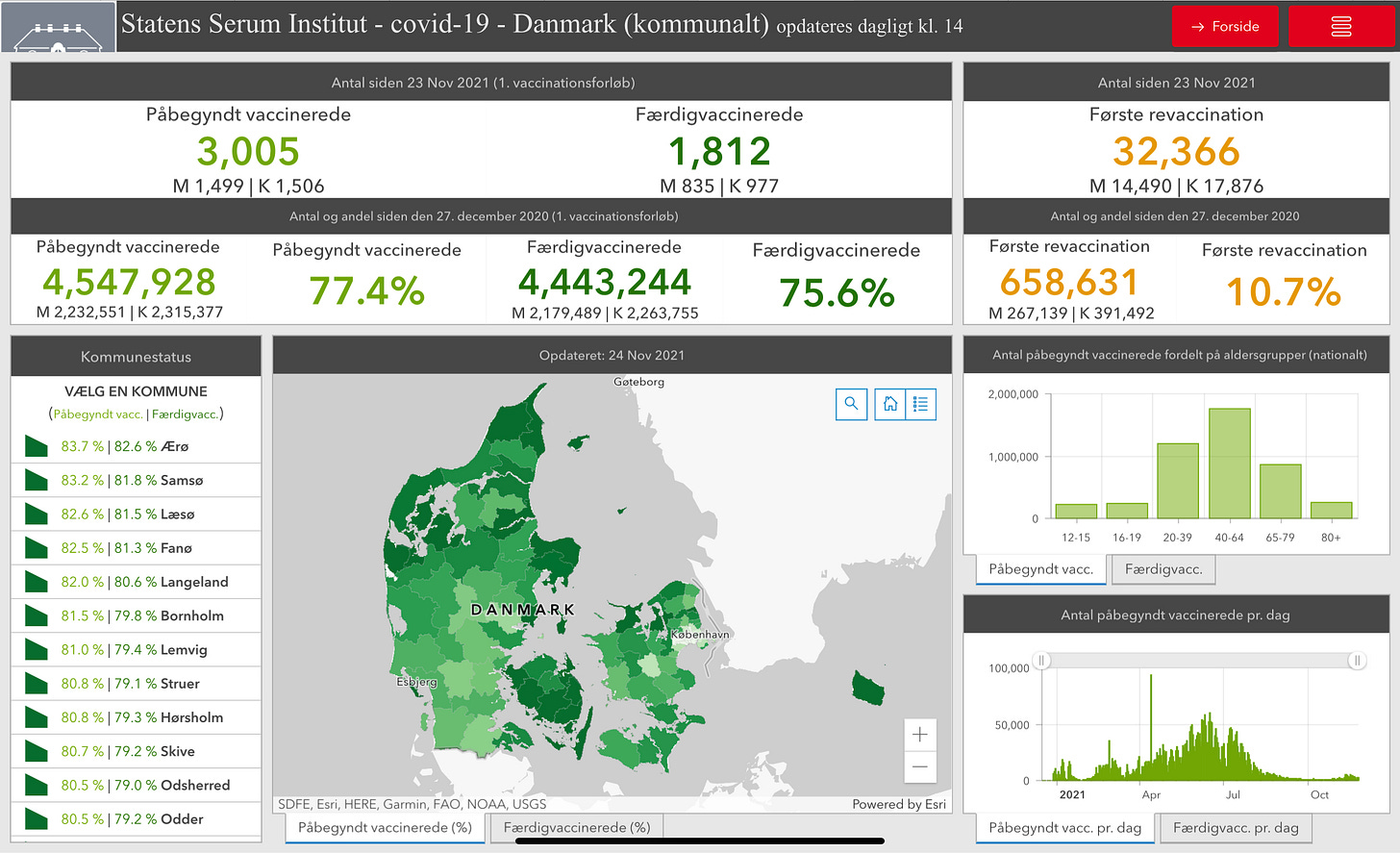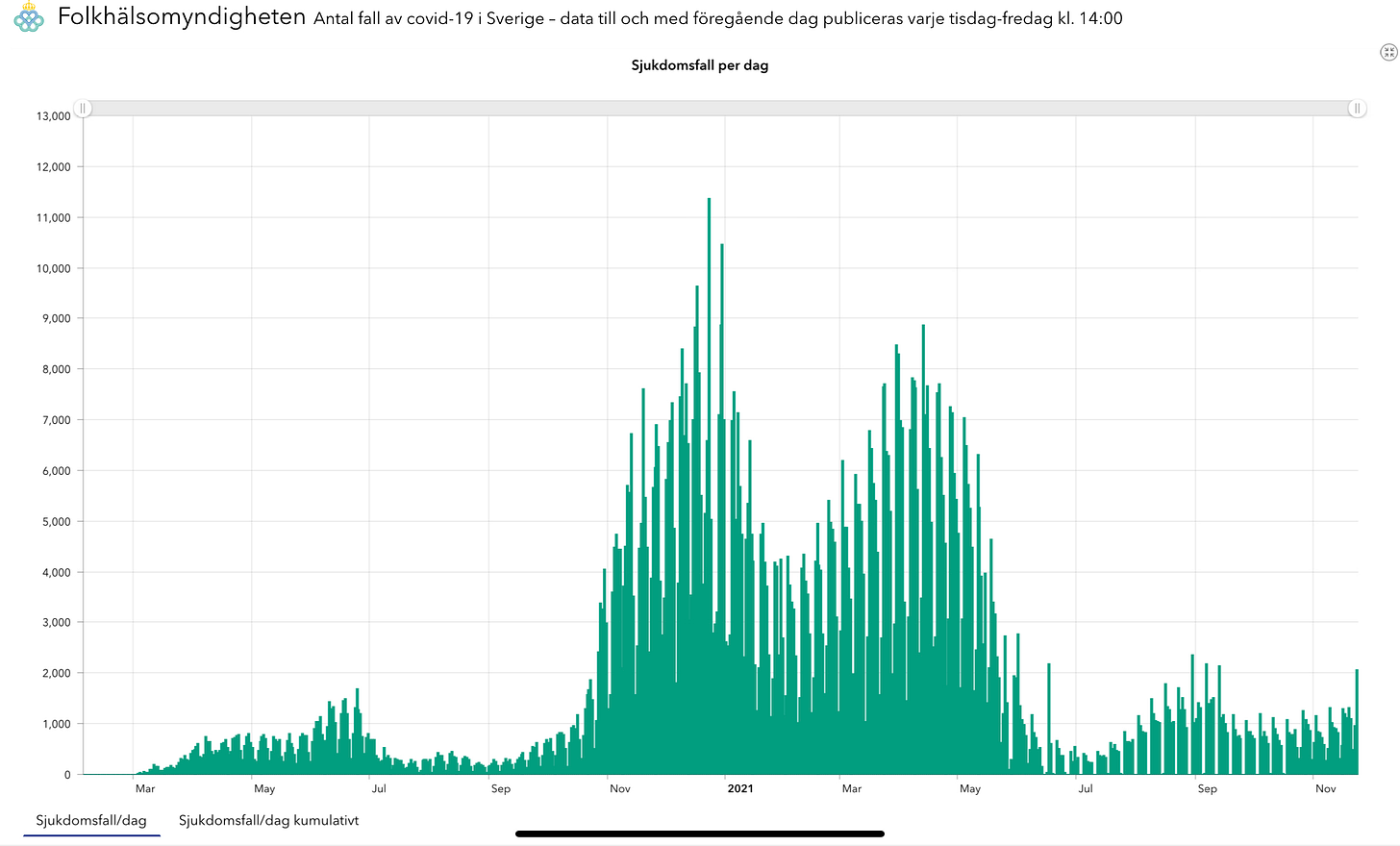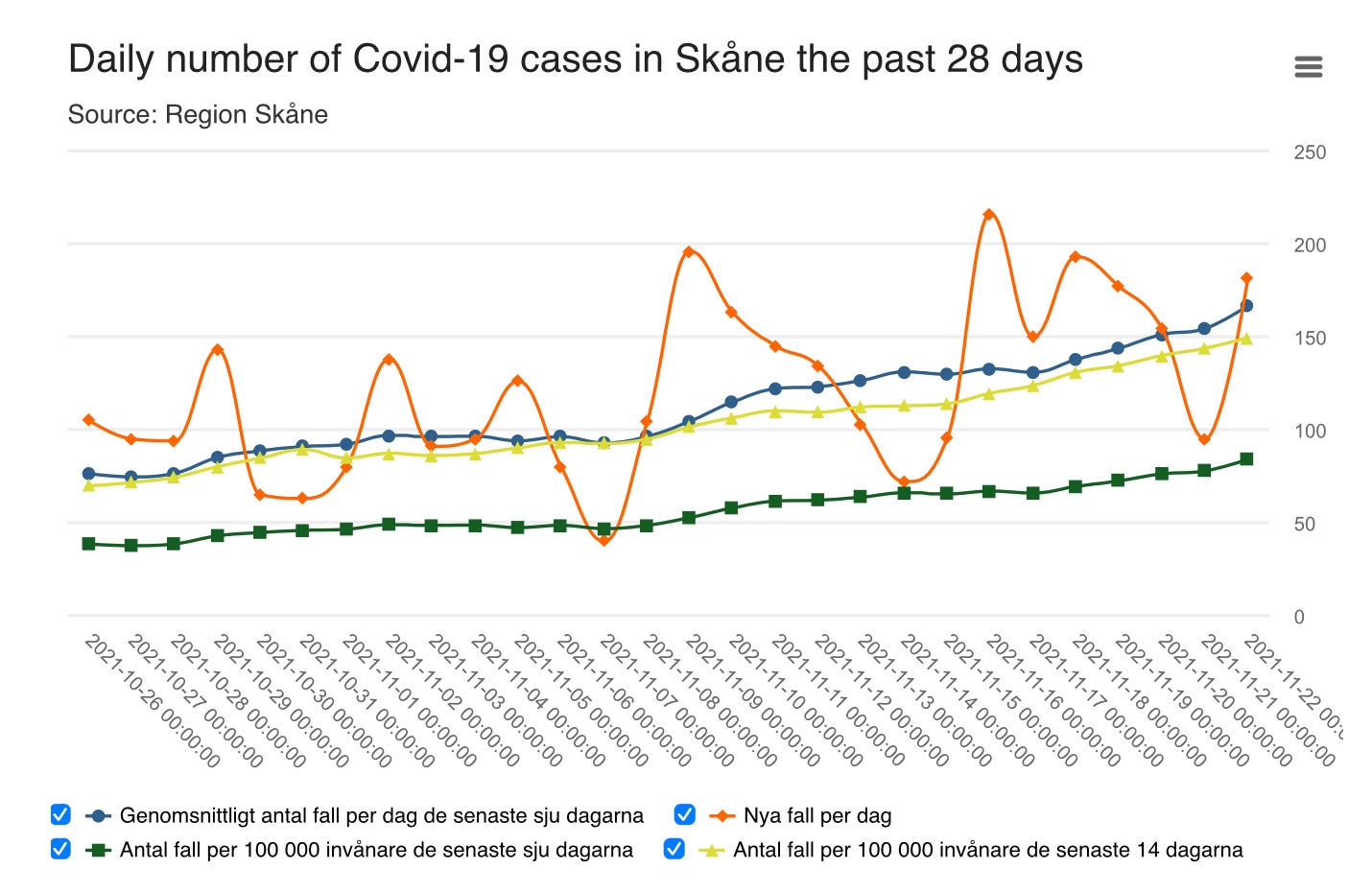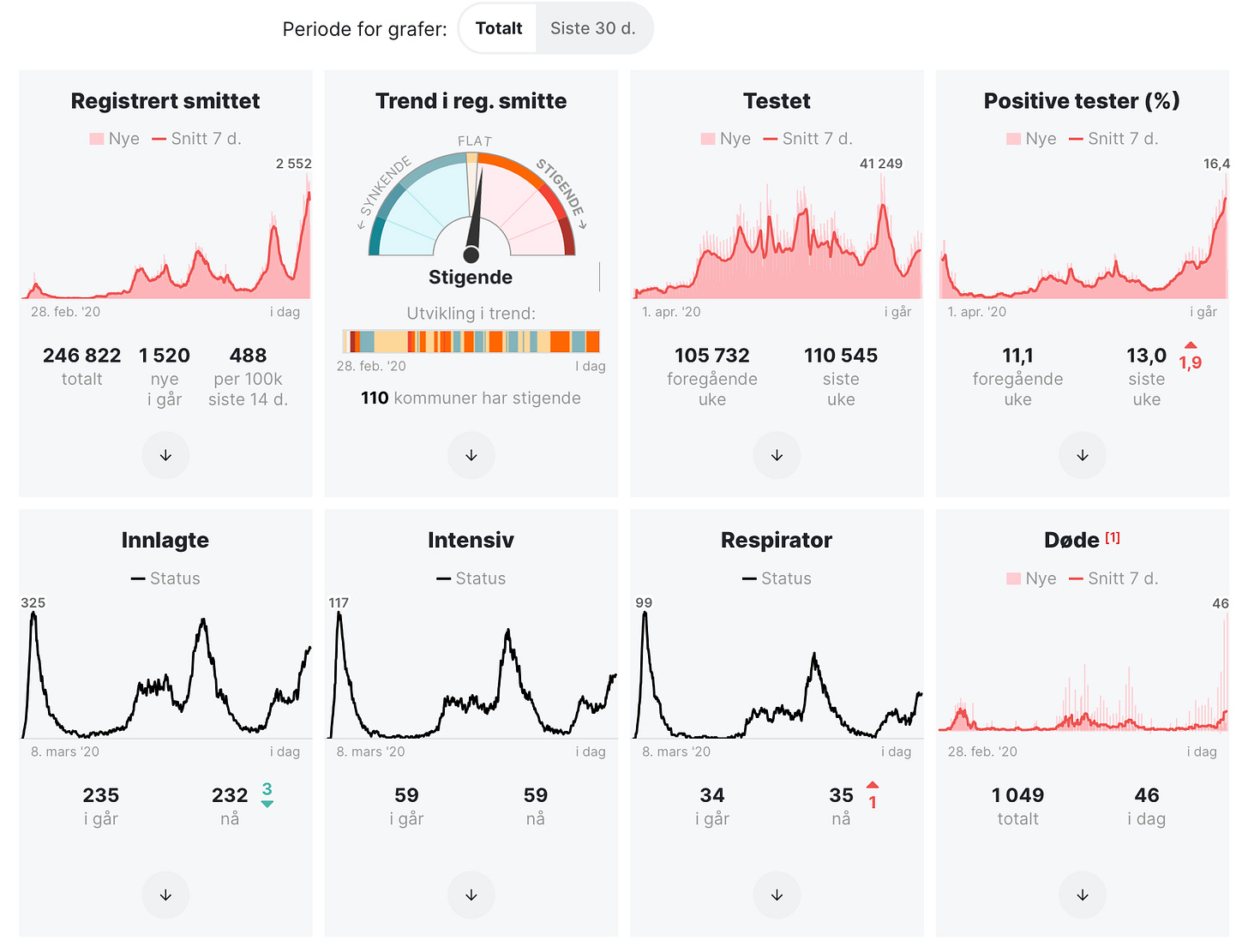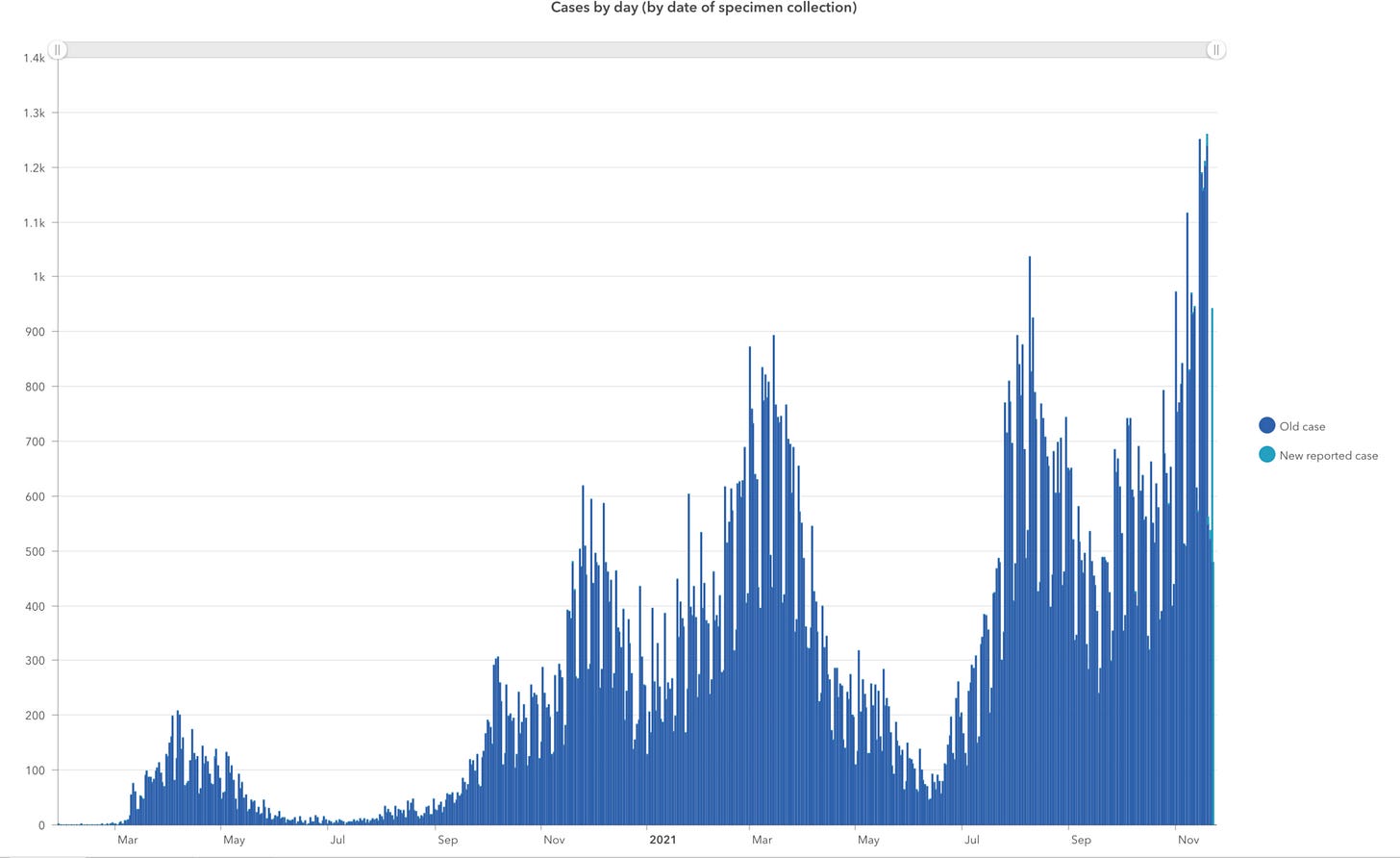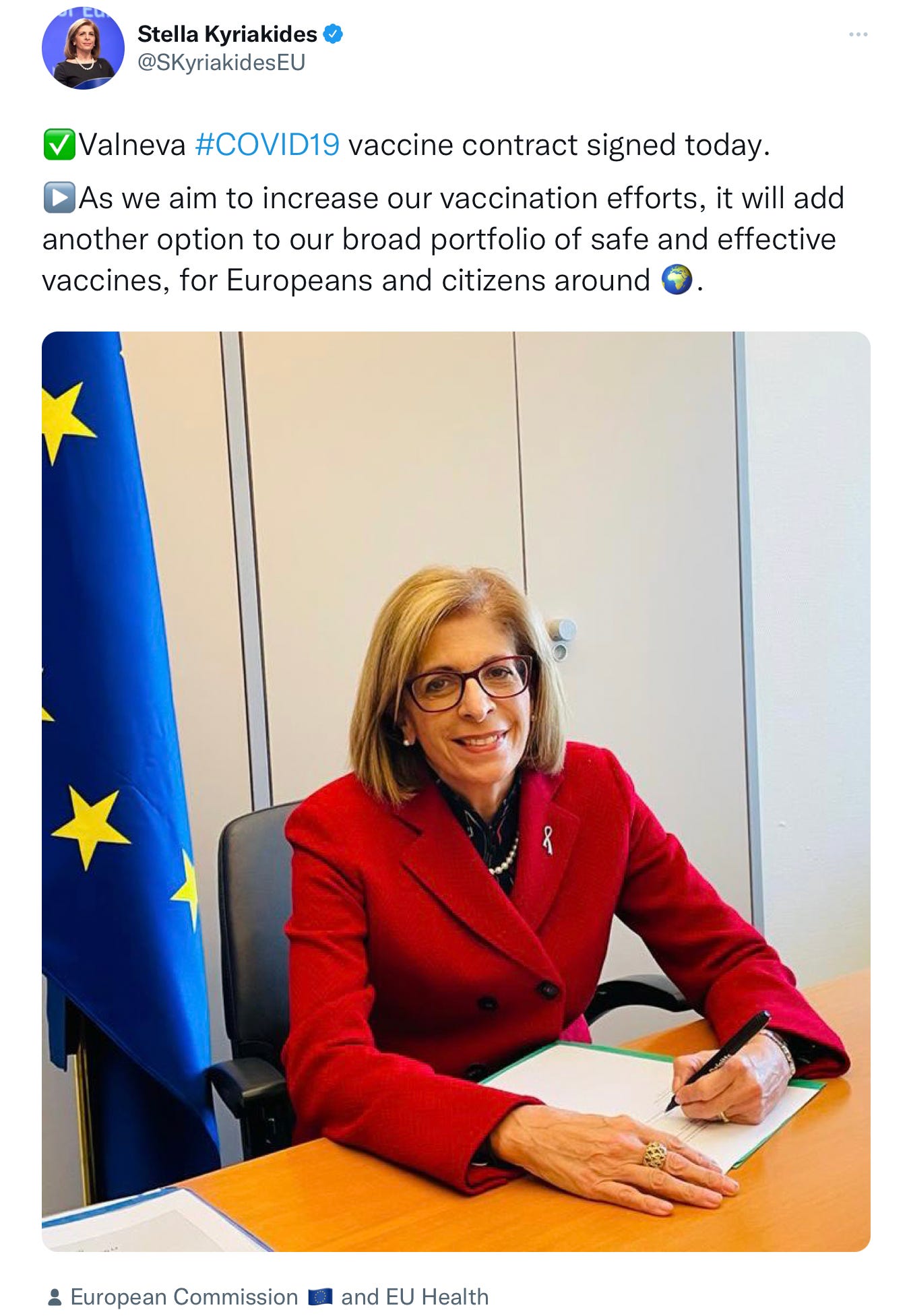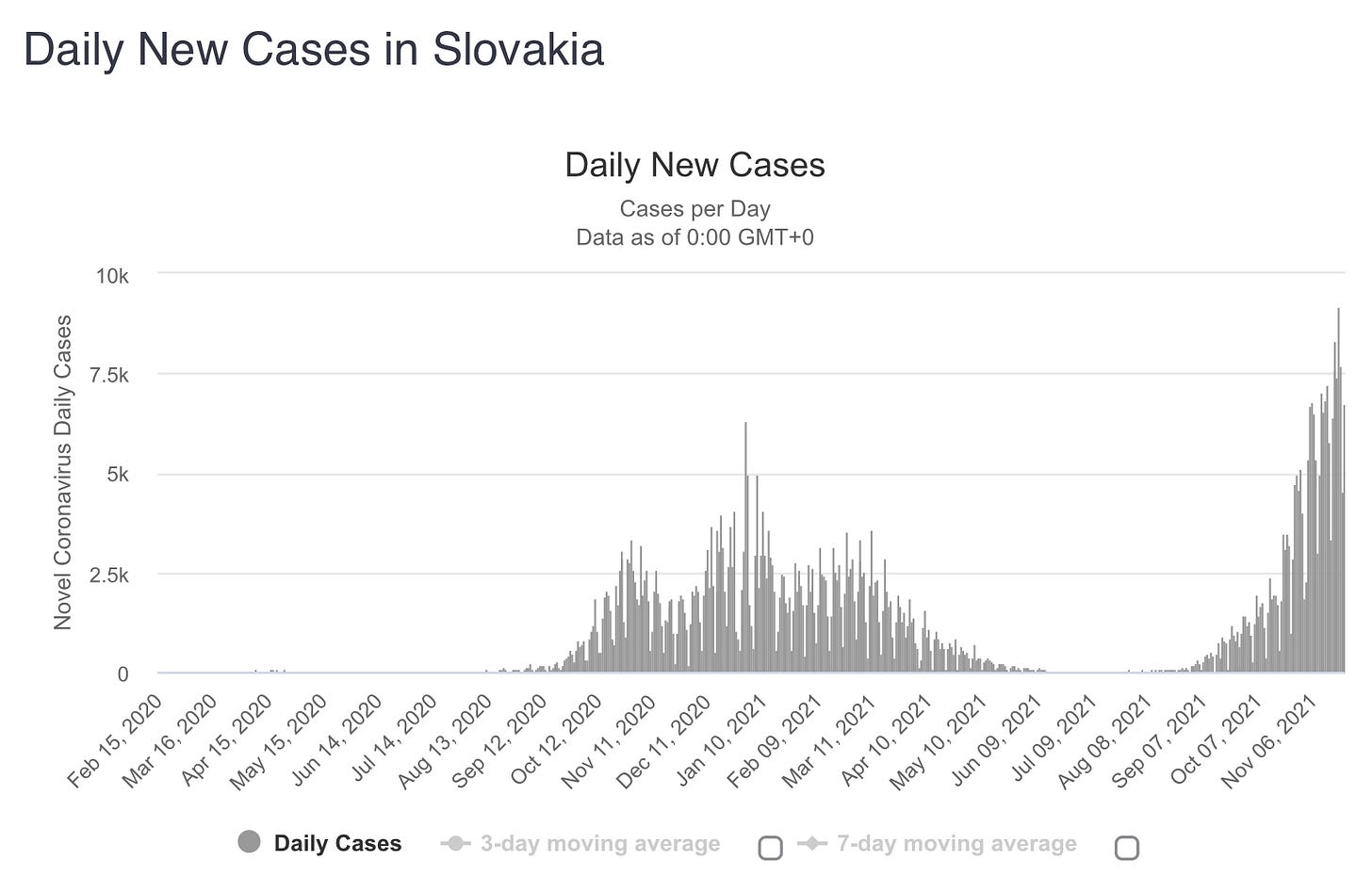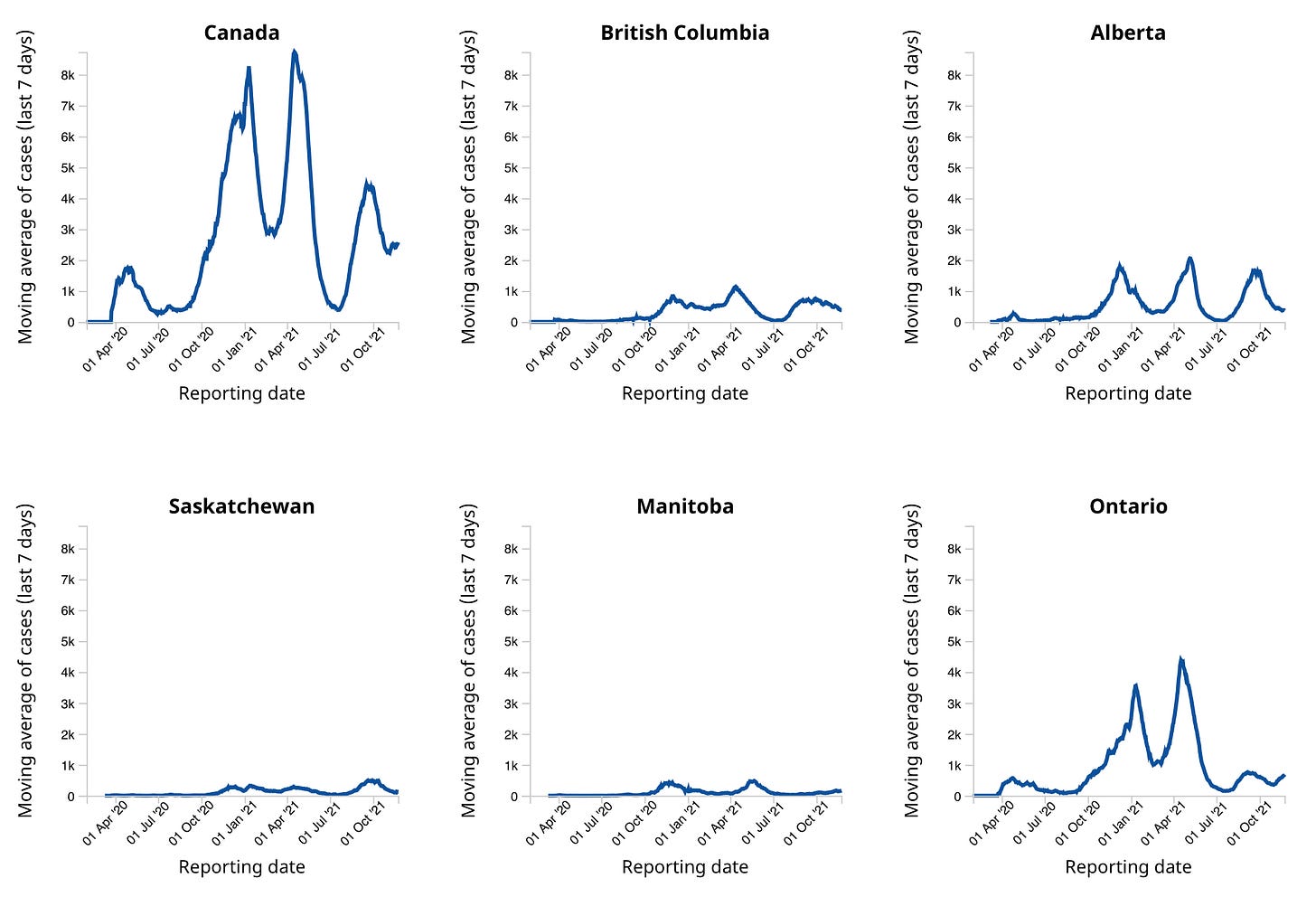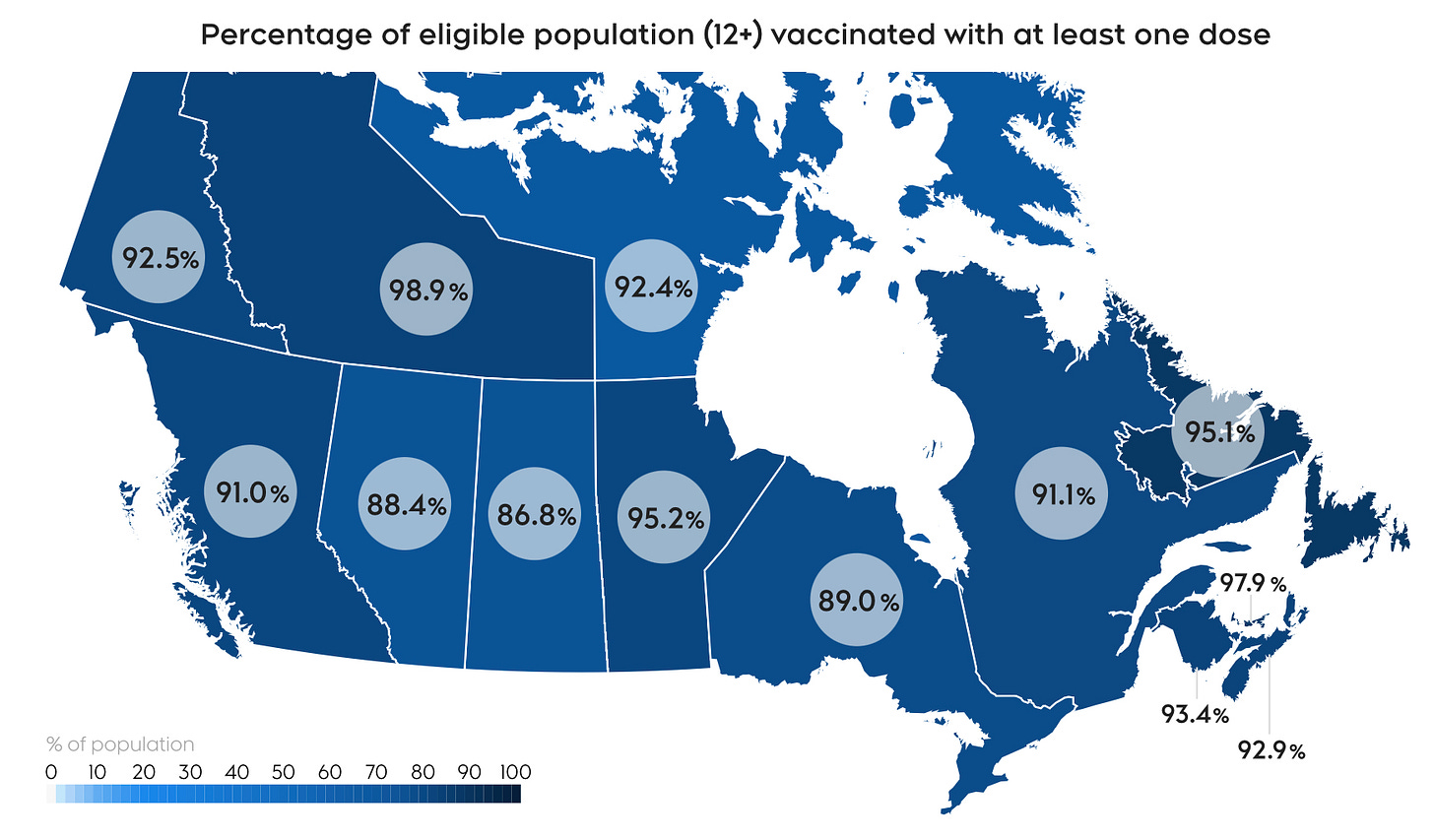The Evening Report - Nov 24
As Europe is warned a bad situation could soon get worse Denmark might reimpose mask use.
🇪🇺
Thursday could be an important day on the vaccination front in Europe. Scandinavian health officials speaking to local media outlets have said they believe that is when the European Medicines Agency will render its decision on Pfizer/BioNTech’s application to extend use of its vaccine to children five to 11 years old. If the EMA approves the application, as it is expected to do, it will allow all EU member nations to begin vaccinating children. However, this may not happen immediately. On Tuesday Germany’s Health Minister Jens Spahn said that the first shipments of the special pediatric Pfizer doses wouldn’t arrive in Europe until December 20.
Both the United States and Canada have approved the use of Pfizer’s pediatric vaccine doses and have begun vaccinating young children.
-
There will be a very high COVID risk unless restrictions and public health measures are urgently implemented. That is the message Wednesday from the European Centre for Disease Prevention and Control to all European Union nations.
The ECDC is warning that while infection activity and hospitalizations across Europe, are mounting unless immediate steps are taken the situation could get much worse. The agency is warning that the more infectious Delta variant, widespread relaxing or removing of restrictions, and lagging vaccination rates all pose a major risk. An infection risk exacerbated by the upcoming holiday season with Christmas parties, family get togethers, increasing traveling, and more socializing.
The European health agency says to date, 65.4% of the total EU population and 76.5% of the adult population are fully vaccinated. It says the overall vaccination pace is slowing down mainly due to lagging uptake among younger age groups. Vaccination coverage varies from country to country and the ECDC notes that, for example, in four EU countries, less than 50% of the population is fully vaccinated. But it also notes that in countries with high vaccination rates there are still too many unvaccinated people providing fertile ground for the virus to spread.
The agency is concerned enough that it has made a significant policy change and are now fully endorsing a robust booster dose effort across Europe.
ECDC Director Andrea Ammon:
“The current overall level of vaccination uptake in the EU/EEA will insufficient to limit the burden of COVID cases and hospitalisations over the winter months, and countries with lower levels of vaccination are at higher risk. Increasing COVID vaccination coverage in all eligible age groups, but particularly the elderly, the vulnerable, and healthcare workers should remain the priority for public health authorities. Europe must close immunity gaps in the adult population and ensure effective and equitable coverage across countries and regions. Countries should also consider a booster dose for all adults 18 years and older, with a priority for people above 40 years old. This is to increase protection against infection due to waning immunity which could potentially reduce transmission in the population and prevent additional hospitalizations and deaths.”
The warning comes as countries across Europe see record high infection numbers and new more devastating COVID waves. Just this week, Slovakia, Hungary, and the Czech Republic all reported the highest daily infection numbers ever. Austria began its fourth national lockdown on Monday. The hospital system in the Netherlands is being overwhelmed and Germany is in a dire situation with its most severe infection wave to date.
🇩🇰
As of next week, people in Denmark could be masking up again. In a COVID press conference held today, Health Minister Magnus Heunicke said a number of changes and restrictions will be run by Denmark’s parliamentary COVID Committee for approval. If a majority on the committee gives a thumbs up, then the changes and returning restrictions outlined below could come into force on Monday November 29. The committee will meet Thursday at 5:00pm.
Face Masks
The biggest restriction that could make a return is face masks. Come Monday, face masks could be mandatory in all retail stores, on public transit, and in “places where there are people at particular risk of infection” according to Sundhedsstyrelsen Director Søren Brostrøm. This could include all hospitals and healthcare facilities for both staff and visitors.
“We would not recommend it if we did not think it was necessary. We recommend that it is only required in places where the infection risk is assumed to be particularly high, because people are crowded together, for example on public transit. When we wear a mask, we do it to prevent infection.”
Brostrøm says the mask mandate, if approved, would remain in place for as long as it would be deemed necessary.
“We have thoroughly assessed the pros and cons, and as the situation is now, with both increasing infection and an increasing number of patients, we believe that masks are a relevant tool to reduce the risk of infection in places where many people are gathered close together, and where it is difficult to keep your distance. How much a mask can alleviate the spread of infection depends on the extent and in which situations we use them.”
Coronapas
The other major announcement is that Denmark’s coronapas could be broadly extended and undergo some other tweaks. The requirement to show a coronapas could soon apply to all government workplaces, adult and youth education, colleges and universities, language centers, and for places like hairdressers and other ‘liberal’ professions.
Health Minister Magnus Heunicke:
“In relation to the requirement for a coronapas in government workplaces, legislation is currently being considered in the Folketing. It is expected to be finally adopted on Friday November 26, and it will be able to come into force then.”
The validity of a negative test in a coronapas could also be shortened. A negative PCR test would go from 96 hours down to 72 and a rapid test would only be valid for 48 hours.
The capacity limit for indoor gatherings requiring a coronapas could also be lowered from 200 attendees down to 100. For outdoor events, the threshold would drop from 2,000 people down to 1,000.
Testing
As Denmark ramps up its once vaunted testing regime, the system is struggling. There are days-long waits to get tested in some region and the wait to get a result is growing. Magnus Heunicke admitted this was a problem and said that work was underway to get it resolved. Heunicke added that overall testing capacity for both PCR and rapid tests will once again be cranked up.
Infection Wave
Staten Serum Institut Director Henrik Ullum said the infection rate has skyrocketed in Denmark, while COVID activity is definitely focused in Metro Copenhagen the epidemic is spreading across the country.
“Over the fall, we have seen a 13-fold increase in infection rates. It is the highest we have had throughout the entire epidemic.”
Ullum says infection rates are highest among unvaccinated school children. While the unvaccinated population overall is seeing COVID infection rates 2.5 times that of the vaccinated population.
As a result of the worsening epidemic situation, he says, the strain is increasing on the healthcare system. But it is not just coronavirus cases, as hospitals are seeing a combination of things all creating a challenging situation. Among them are staffing shortfalls, backlogs from the recent nurses labour dispute, and other respiratory infections.
“We must remember that everyone who is admitted with a coronavirus infections is an extra challenge because they must be isolated so that they do not infect others.”
Health Minister Magnus Heunicke echoes that and adds that infection activity overall and the subsequent strain on healthcare is also because Denmark returned to normal without any restrictions allowing the virus to spread freely.
Vaccinations
The importance of getting vaccinated was stressed repeatedly in today’s press conference. National Health Board Director Søren Brostrøm says whether it is a first, second, or third dose, people need to take advantage and go get vaccinated. To that end, he notes, the overall vaccination capacity is being expanded.
“The vaccination rate is being sped up now, so more people can book time for a 3rd dose and within a week more booking times will be available in the regions.”
Magnus Heunicke was asked at the press conference why Denmark isn’t putting in measures aimed directly at unvaccinated people. Heunicke says the Danish model has been to be open, communicate, and offer plenty of opportunities to get vaccinated without coercion. He says this has proven to have the best results.
Heunicke added that kommunes can now set up vaccination sites in large facilities like sports halls, much like it was during the initial mass vaccination roll-out.
Christmas
The subject of julefrokosts came up at the news conference and Søren Brostrøm says it is okay to celebrate Christmas this year. That said, he adds that basic precautions must be taken. People should be vaccinated, if they are sick then stay home, and to be safe, try and maintain social distancing.
-
Denmark is reporting 4,426COVID infections and nine more coronavirus deaths in the last day.
Yesterday there were 330,835 total corona tests done, of which 181,841 were PCR tests equaling a positivity percentage of 2.43%.
-
COVID hospitalizations (435) dropped (-9) while the number of infected people in an ICU (49) was unchanged day to day of those the number on a ventilator (22) was also unchanged.
-
On the vaccination front, there were 37,183 total inoculations yesterday, of which, 32,366, were booster doses. There were 3,005 1st doses administered, which is good news.
To date, 77.4% of the total population has one vaccine dose, 75.6% have two, and 10.7% have a booster dose.
-
Region Hovedstaden (Metro Copenhagen) says it is pressing turbo on its vaccination effort. The region has opened a new vaccination site in Amager and is busy hiring more vaccination staff in order to increase daily inoculation capacity.
Regional Council Chairman Lars Gaardhøj:
“We are currently experiencing an increasing infection rate and increased pressure on our hospitals, so we are going full speed on vaccinations. It's no secret that we are under pressure from staff shortfalls, so if there are retired health professionals, students, or other healthcare professionals who have the opportunity to lend an extra hand in vaccinating, then it would be a huge help.”
As of December 1 the region says it will have the capacity to administer 100,000 vaccinations per week. It is also going to extend operating hours of its vaccination centers and keep them open into the weekends.
The region says 1st-dose vaccine coverage in Metro Copenhagen has now reached 88%.
🇸🇪
Sweden added 2,076 infections and another 16 corona deaths since yesterday’s update.
To date, 7,302,089 1st vaccine doses have been administered (85.5% of the population 16 years old and older) while 7,010,751 people (82.2%) have had both doses.
The Swedish Public Health Agency has not updated vaccination data for 12 to 15 year olds or for the number of booster doses administered.
-
The Swedish Public Health Agency is now recommending everyone 18 years old and older get a booster dose of the COVID vaccine. But, the health agency says the 3rd dose should be given to priority groups first and then the general population. In Sweden, booster shots are already being given to the two highest priority groups seniors in care, everyone 65 years old and older, and health and senior care staff.
Now the public health agency has set the next priority group. It is comprised of everyone 18 years and older in a vulnerable and high risk group including children with mental and physical disabilities. Any and all health and social care staff working with these groups. Also included in the next phase is everyone 50 years old and older.
Once those priority groups are well underway, then the call for a booster dose will go out to every fully vaccinated person in Sweden 18 to 49 years of age.
Director General Karin Tegmark Wisell:
“It is very important that the regions work as quickly and efficiently as possible to vaccinate the population, so that we get a high level of coverage. The vaccine protects very well against infection, serious illness and death from the coronavirus, and now it is time to offer enhanced protection in the form of a booster dose to all adults based on need.”
The National Health Agency recommends a booster dose be given six months after a second dose has been administered. However, for seniors 65 years old and older, a 3rd shot can be given five months after the second dose.
A booster dose is either a half dose of the Moderna vaccine or a full dose of the Pfizer/BioNTech vaccine. The Swedish Public Health Agency also recommends that everyone 20 years old and younger who qualifies for a booster shot get the Pfizer vaccine.
-
COVID infections and hospitalizations have increased in Region Skåne for a sixth week in a row. The region is urging everyone to get vaccinated, be it a first, second, or third dose.
Regional Director Alf Jönsson:
“The number of patients is increasing in health care. We have a very strained situation in healthcare, our employees are struggling.”
The region notes that it is seeing an uptick in the number of vaccinations likely triggered by the impending vaccine passport system set to arrive across Sweden on December 1.
-
Region Stockholm says it, too, is seeing increasing infection activity. Last week there were 1,791 new infections, which is 275 more than the week before.
Chief Physician Johan Bratt:
“We are seeing an increased spread of infection in the region, it is worrying. Especially considering that the infection is increasing dramatically in many neighboring countries.”
🇳🇴
Norway added 1,520 infections and another 46 pandemic deaths since yesterday’s update.
COVID hospitalizations (232) dropped slightly (-3) while the number of infected people in an ICU (59) is unchanged, and of those ventilator numbers (35j crept upward (+1).
So far, 78.5% of Norwegians 12 years old and older have had one vaccine dose and 70.5% are fully vaccinated.
-
The Norwegian capital of Oslo has reimposed some COVID restrictions as it remains the epicenter of the country’s latest infection wave. Face masks are now recommended on all public transit, in retail stores, and in any crowded indoor setting. Healthcare workers who are not vaccinated must mask up at work and get tested twice a week. The city is also continuing an increased COVID testing program to break the chains of infection.
-
Norway is donating five million vaccine doses to the international vaccine collaboration COVAX. A number of those doses are earmarked for African countries. The Norwegian government says the donation will not impede its national vaccination program.
🇫🇮
Finland registered 1,007 infections and 39 more virus deaths in the last day.
COVID hospitalizations (306) are down (-16).
So far, 76.1% of the total population have one vaccine dose, 71.4% have two, and 3.5% have had a booster dose.
-
As Finland battles its worst infection wave to date and pressure mounts from municipal politicians, business, and cultural groups the Finnish government will meet next week to discuss possibly reimposing restrictions. YLE is reporting that pressure on Finnish authorities is really mounting.
Prime Minister Sanna Marin spoke to YLE:
"The coronavirus situation is worrying. It is now more important than ever that everyone gets the vaccines available to them."
Meanwhile, Helsingin Sanomat is reporting that there is division within the government on how to handle arriving travelers as infections soar. Some members of the government want to impose a testing system on all unvaccinated travelers, but others are opposed.
Another item up for debate next week will be whether to extend the coronapas system to include workplaces.
🇪🇺
The European Union Commission has signed an advance purchase agreement with the pharmaceutical company Valneva for doses of its COVID vaccine. According to the company, the deal is for 60 million vaccine doses, with the first 23 million slated to arrive in the second and third quarter of 2022. As with all other advance purchase agreements, the vaccine must be deemed to be effective in fighting the coronavirus and be approved for use in Europe by the European Medicines Agency.
This would be the eighth advance purchase agreement signed by the European Union with different vaccine makers.
🇸🇰
Slovakia will begin a two week partial lockdown on Thursday. All restaurants and shops must close and only essential stores can remain open. The Slovakian government has also declared a 90 day COVID state of emergency. This will allow it to oppose a nightly curfew where people can only leave their homes for essential reasons like going to work or to see a doctor. As well, fully vaccinated people can go to work as normal, but those that are not vaccinated must undergo weekly COVID testing.
🇨🇦
Canada reported 2,224 COVID infections while losing another 32 lives to the coronavirus on Tuesday. Nationally, the positivity percentage in Canada has been 3.1% over the last week.
The vaccination effort in Canada has so far administered 30,079,474 1st vaccine doses (78.67% of the total population) while 28,876,081 people (75.52%) are fully vaccinated. So far, 779,159 booster doses have been administered.
In Ontario Wednesday there were 591 infections, of which 307 were not fully vaccinated. There are 289 people in hospital and 230 of those are either unvaccinated or have a single dose. Among the 137 in an ICU, that number is 123.
Quebec reported 882 new COVID cases, its highest number since September 4, and one more death on Wednesday.
In Atlantic Canada, New Brunswick has 87 new corona cases. Nova Scotia has 20. Newfoundland and Labrador has four.
Manitoba saw 147 coronavirus infections and three more deaths on Wednesday.
There were 90 new infections in Saskatchewan on Wednesday.
Alberta registered 253 infections and 10 more COVID fatalities on Tuesday. There are 475 people in hospital, including 94 in an ICU.
B.C. recorded 324 new corona cases and one more death on Tuesday. There are 345 people in hospital, including 115 in intensive care. 82% of those in an ICU are either unvaccinated or have just a single dose.



